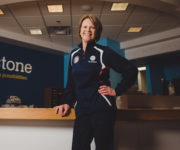Meet the Match
A Lebanese Woman Empowers Children with Disabilities
From the time she was a girl, Iman Sabbagh knew to always look beyond the surface.
Born in Sidon, the third largest city in Lebanon, Iman and her family lived in a large apartment building with families from many diverse backgrounds. She spent much of her time playing soccer or basketball together with the other children in building’s courtyard. She never assumed any inherent differences between them.
Iman carried that mentality through adulthood. After completing secondary school, she chose to study special education at the Modern University for Business and Science. The course was relatively new to Lebanon, and she knew it would increase her prospects of securing a full-time job after graduation.
In 2007, Iman became a classroom teacher at Sidon Orphan Welfare Society, where she taught Arabic, English, mathematics and science to children with mild and moderate cases of intellectual disability. During this time, she became exposed to the Special Olympics movement.
“One day, Special Olympics came to our school and the P.E. teacher asked for my help in soccer, basketball, and swimming,” Iman says. “When I was playing with the kids, it didn’t feel like a job anymore. I loved it.”
By 2010, Iman had traveled to the Special Olympics World Summer Games as an assistant swimming coach. Soon afterward, she was coaching soccer, cross-country, badminton, boccia, cycling and any other sport she was asked to help with the Special Olympics organization. It reawakened a love of sport in her that was formed by those years playing in the courtyard with her friends and watching NBA games with her brother (Iman continues to play for second and third division women’s basketball teams in Lebanon).
As she became more involved in the movement, Iman began seeing the unique ways sport promotes equality and inclusion, while also instilling values, good behavior, and developing physical strength and healthy lifestyles for children with intellectual disabilities. Most importantly, she saw how it broke down concepts of disability and the unfair way it is linked with inability.
“Sport teaches you the value of the human being,” Iman says, “and not that we should see the difference between one person and another. We are all different and we have strong and weak points, and if we see only the weakness and label a person based on this weak point we are not really helping them develop as a human.”
In 2011, Iman took a new job as a physical education teacher with Imam Sadr Foundation, an organization with a 50-year history of combatting illiteracy, poverty, illness and violence through education, healthcare, empowerment and local development programs. In this role, she began developing adaptable curriculum for children of many different ability levels, as well as deepened her involvement with Special Olympics. In 2017, she was the Lebanese delegation’s cross-country skiing head coach and led her team to six medals (Lebanon won 11 overall), and she will serve as badminton head coach for the 2019 Summer Games in Abu Dhabi.
Disability is still largely misunderstood in much of Lebanon. A national survey conducted in 2004 estimated the disability prevalence rate in Lebanon at two percent, or approximately 120,000 people. A more recent release of statistics in 2014 placed the number at slightly less, while stating that intellectual disabilities account for 28.4 percent of these individuals.
Many spaces, however, remain inaccessible. People with physical disabilities cannot move freely around, and the larger Lebanese community lacks awareness about special needs, relating to physical or learning disabilities. Iman’s school tries to address this issue by regularly inviting mainstream schools to visit and participate in classes.
“They are usually so surprised,” Iman says. “They think they only paint! As a country, we have very weak awareness about special education. If you see someone with Down’s syndrome, you think they must be crazy, not someone who is like you but with different abilities.”
Iman’s school is in the process of integrating and unifying its soccer and basketball teams. The school even organized a large sports event where special education and mainstream teams competed together. The event was important for creating awareness. Iman continues pushing for more inclusive initiatives.
As part of her participation in the U.S. Department of State Global Sports Mentoring Program, Iman sought to take her impact one step further and learn how she can establish an inclusive adaptive sports center serving children with physical and intellectual disabilities, as well as the non-disabled. During the program, she worked with Tina Acosta, director of program outreach, and other leaders at Turnstone, one of the United States’ largest centers providing therapeutic, educational, wellness and sports programs to empower people with disabilities. With their guidance, Iman has learned all the steps, from identifying like-minded leaders to fundraising, that go into creating comprehensive, wide-reaching programs for first-time and competitive athletes of all ability levels. Their collaboration demonstrates the ways that change makers in both the U.S. and Lebanon work to promote inclusion and equality internationally.

